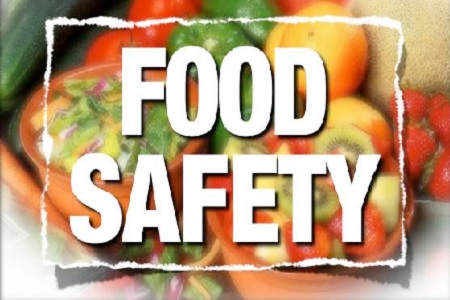By Stacy Carmichael-James
The Food Safety Bill which seeks to prevent the spread of foodborne diseases through the control of the production, preparation, handling, storage and the transportation of food and provide for connected measures was on Thursday evening sent to a Parliamentary Special Select Committee for further examination.
This was the second time for this sitting of the Assembly that the request by the Opposition for a bill to be sent to the Select Committee was granted.
The passage of the bill will see the establishment of a Food Safety Authority, an Advisory Board and a National Food Safety Committee.
Need for Food Safety Laws
Agriculture Minister Noel Holder said as Guyana moves towards a more modernized agricultural sector with an effective and more sustainable system for ensuring food security, access to safe food and maintaining a healthy and productive population, a bill is introduced. For Guyana to be a part of the worldwide food system, where the goal is food security, Minister Holder stressed that there needs to be an overhaul of Guyana’s food laws.

The Minister pointed out that in today’s world consumers ask more of authorities. “Consumers want assurance that the food they consume is produced in an animal-friendly and environmentally sustainable way.”
Holder said under this Act, a Food Safety Authority would be created and by doing so Guyana would be following suit of the Canadian Food Inspection Agency in maintaining consumer confidence at a high level to alleviate concern. The auspices of the Authority falls under the Ministry of Agriculture. Initially, the Minister informed, funds would be appropriated from the parent agencies.
According to the minister, the Food Safety Authority introduces to Guyana numerous cautionary and solution-oriented methods and stipulations that have been prescribed by international bodies such as Codex Alimentarius, a subsidiary of the World Health Organization (WHO).
It is envisioned that the Food Safety Bill when enacted, would create an effective and more sustainable system for ensuring access to safe food and health.
Reduction of Infant Mortality
Dr. George Norton in his arguments for the passage of the bill said it coincides with Government’s goal to reduce infant mortality as a result of acute gastroenteritis, which is one of many foodborne diseases caused by toxins that enter the body through the foods consumed.

He noted that the regulations and other requirements included in the bill will safeguard citizens and bring Guyana on par with international phytosanitary standards.
Importance to Culture
Minister Nicolette Henry in support of the bill said there are potential opportunities for the creative industries to be better leveraged, which provides excellent context to strengthen cooperation with partners. She noted that cultural products such as cassareep, farine, wines and even syrups made from local fruits could be given a boost with the possibility of export due to the establishment of enabling legislation to regulate and certify their production.
Abuse of Power
Opposition Member of Parliament, Dr. Bheri Ramsaran told the House while recognizing the need for food safety, the power bestowed upon the food analysts and inspectors may lead to the abuse of power and undermine the aim of the bill.
Ramsaran deemed it a “beautiful document” but reasoned that it can be better if looked at closer and recommended that it be sent to a Parliamentary Special Select Committee.
Burdensome on Small Food Vendors
His other colleagues Odinga Lumumba and Dharamkumar Seeraj argued that the bill will impose hardships on the small man particularly the Food Handler’s Certificate and other requirements for street vendors. Lumumba recommended that the bill in its current be re-examined to adequately address these issues. He called for training and educating of the owners of small food businesses. DharamKumar Seeraj contended that the ordinary street vendor is not ready for this bill because it would be too burdensome.
Genetically Modified Organisms
Seeraj raised concerns as it relates to the aspect of the bill that deals with Genetically Modified Organisms, popularly known as GMOs. He said greater clarity is needed in this regard. The importation of wheaten flour and products made from wheaten flour would mean that there is consumption of GMOs; therefore he noted that the bill needs to be more definitive in terms of Guyana’s position on GMOs.

The Biggest danger to food safety lies at ports of entry, Seeraj said. This is an area he believes Guyana can do a lot more in terms of building capacity with more personnel at points of entry. He reasoned too that Guyana would want to protect national interest by ensuring that the foods exported have no cause to be returned when it arrives in another territory since this can tarnish the country.
Additional Tax Burden
Vickram Bharrat in his arguments alluded to the fact that the cost attached to the establishment of the three new agencies would also translate to more money coming out of the pockets of taxpayers.
Another Opposition MP, Nigel Dharamlall questioned the relevance of the Food and Drug Department given the fact that several authorities would be established to directly address food safety.

One step closer to compliance
Meanwhile, Natural Resources Minister Raphael Trotman said the bill is a step in bringing Guyana into conformity with international standards, noting that it is not farfetched given the rate at which diseases spread across borders. He clarified that the bill seeks to consolidate the functions of the other agencies. As the country matures it has to raise its standards and while the street vendors expect the good life, Trotman said they also expect that Members of Parliament would improve standards.
He alluded to school children stricken with illnesses as a result of poorly prepared food being sold by small canteens and other street vendors. Modern international standards as it relates to food handling, packaging and preparation are reflected in the Food Safety Bill he maintained. This will ensure acceptability for exportation of food in foreign markets.
Gaps to be filled- Opposition’s rebuttal
PPP/C MP Dr. Frank Anthony in his rebuttal rejected the Government’s argument that the bill seeks to bring Guyana in conformity with international standards deeming Guyana’s arrangement a “cook up” with “bits and pieces” taken from various documents.

He called for several technical issues to be rectified and questioned what process would be used to determine the fees and other costs that would be charged for permits and other requirements stated in the bill.
Anthony said there are a number of gaps that need to be filled to improve the bill.













